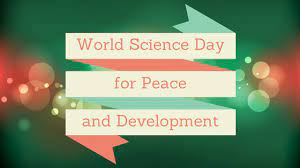The International Week of Science and Peace (IWSP) is a timely reminder of how science, technology, and peaceful collaboration can transform nations and uplift societies. In Nigeria, a country blessed with abundant resources, a vibrant youth population, and boundless potential, this week represents a call to harness scientific innovation for national progress and societal peace. As Nigeria observes the IWSP, we should reflect on how science can be used as a tool to foster peace, drive economic growth, address pressing challenges, and unite communities across diverse cultural lines.
The United Nations established the IWSP in 1986 to underscore the importance of science in fostering global peace and development. The mission aligns with Nigeria’s aspirations of becoming an economic powerhouse driven by knowledge and innovation. However, achieving this vision demands that Nigeria prioritise scientific research, technological investment, and an educational overhaul that encourages scientific curiosity and critical thinking. By strengthening these pillars, Nigeria can lay the foundation for addressing critical issues, including healthcare access, food security, clean energy, and climate resilience.
Science and peace are deeply interconnected. Scientific advancements allow nations to address social needs, reduce inequalities, and foster sustainable development, which in turn help to minimise social tensions and foster unity. In Nigeria, where socio-political tensions have occasionally erupted into violence, science offers avenues to address underlying issues, especially in sectors like agriculture, energy, and health. For instance, through innovations in sustainable agriculture, Nigeria could address food insecurity, boost rural economies, and reduce conflicts over resources. Similarly, advances in renewable energy can bridge energy access gaps, reducing socio-economic disparities and enhancing the quality of life across the country.
Investing in science and technology also means creating a framework where young Nigerians are inspired and empowered to become innovators and problem solvers. Nigeria has a large youth population, and investing in STEM (Science, Technology, Engineering, and Mathematics) education and entrepreneurship would enable the country to harness its youth’s potential for development and peaceful nation-building. By promoting an educational system that prioritises scientific inquiry, Nigeria can cultivate a generation equipped to drive technological advancement and socio-economic transformation.
Collaboration on science and peace initiatives with neighboring countries and the global community is also critical for Nigeria. The IWSP highlights the importance of peaceful international collaboration, which Nigeria can embrace by partnering on cross-border research initiatives and knowledge exchange programmes with countries within and beyond Africa. These partnerships can facilitate shared solutions to common challenges, such as health crises, environmental degradation, and regional security, while also fostering diplomatic goodwill.
Moreover, it is essential for the federal government to champion policies that fund and protect scientific research and innovation. Governments worldwide have realised that science policy is peace policy, a recognition that has seen them allocate considerable budgets to research and development (R&D). Nigeria, which currently spends less than 0.5 per cent- of its GDP on R&D, would benefit from increasing its budget allocation to science, ensuring that innovators, researchers, and institutions have the resources to address local challenges and contribute to global scientific discourse.
Nigeria’s observance of the IWSP this year should serve as a springboard to championing science as a national priority. By building an ecosystem that fosters scientific innovation and peaceful collaboration, Nigeria can position itself as a beacon of progress and stability, not only in West Africa but across the continent. Let this week remind us of the power of science to drive peace and of our collective responsibility to harness it for the good of all Nigerians.





